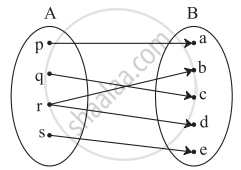Advertisements
Advertisements
प्रश्न
Answer the following:
A function f is defined as f(x) = 4x + 5, for – 4 ≤ x < 0. Find the values of f(–1), f(–2), f(0), if they exist
उत्तर
f(x) = 4x + 5, – 4 ≤ x < 0
f(–1) = 4(–1) + 5 = –4 + 5 = 1
f(–2) = 4(–2) + 5 = –8 + 5 = –3
x = 0 ∉ domain of f
∴ f(0) does not exist.
APPEARS IN
संबंधित प्रश्न
Let A = {9, 10, 11, 12, 13} and let f: A → N be defined by f(n) = the highest prime factor of n. Find the range of f.
Let A = [p, q, r, s] and B = [1, 2, 3]. Which of the following relations from A to B is not a function?
If \[f\left( x \right) = \frac{2x}{1 + x^2}\] , show that f(tan θ) = sin 2θ.
Let f and g be two real functions defined by \[f\left( x \right) = \sqrt{x + 1}\] and \[g\left( x \right) = \sqrt{9 - x^2}\] . Then, describe function:
(vii) f2 + 7f
Let f and g be two real functions defined by \[f\left( x \right) = \sqrt{x + 1}\] and \[g\left( x \right) = \sqrt{9 - x^2}\] . Then, describe function:
(viii) \[\frac{5}{8}\]
Let f : [0, ∞) → R and g : R → R be defined by \[f\left( x \right) = \sqrt{x}\] and g(x) = x. Find f + g, f − g, fg and \[\frac{f}{g}\] .
Write the range of the real function f(x) = |x|.
If f(x) = cos [π2]x + cos [−π2] x, where [x] denotes the greatest integer less than or equal to x, then write the value of f(π).
Write the range of the function f(x) = ex−[x], x ∈ R.
Write the domain and range of function f(x) given by
If f : Q → Q is defined as f(x) = x2, then f−1 (9) is equal to
The range of f(x) = cos [x], for π/2 < x < π/2 is
The range of the function \[f\left( x \right) = \frac{x}{\left| x \right|}\] is
A function f is defined as follows: f(x) = 4x + 5, for −4 ≤ x < 0. Find the values of f(−1), f(−2), f(0), if they exist.
Check if the following relation is a function.

Check if the relation given by the equation represents y as function of x:
x2 − y = 25
Find the domain and range of the following function.
f(x) = `root(3)(x + 1)`
Express the area A of a square as a function of its perimeter P
Express the following logarithmic equation in exponential form
`log_(1/2) (8)` = – 3
Write the following expression as sum or difference of logarithm
`log (sqrt(x) root(3)(y))`
Given that log 2 = a and log 3 = b, write `log sqrt(96)` in terms of a and b
Solve for x.
x + log10 (1 + 2x) = x log10 5 + log10 6
If x = loga bc, y = logb ca, z = logc ab then prove that `1/(1 + x) + 1/(1 + y) + 1/(1 + z)` = 1
If f(x) = 3x + 5, g(x) = 6x − 1, then find (fg) (3)
Select the correct answer from given alternatives.
If f : R → R is defined by f(x) = x3 then f–1 (8) is equal to :
Answer the following:
Let f : R – {2} → R be defined by f(x) = `(x^2 - 4)/(x - 2)` and g : R → R be defined by g(x) = x + 2. Examine whether f = g or not
Answer the following:
Let f : R → R be given by f(x) = x3 + 1 for all x ∈ R. Draw its graph
Answer the following:
For any base show that log (1 + 2 + 3) = log 1 + log 2 + log 3
Answer the following:
Simplify, log (log x4) – log (log x)
Answer the following:
Solve : `sqrt(log_2 x^4) + 4log_4 sqrt(2/x)` = 2
Let X = {3, 4, 6, 8}. Determine whether the relation R = {(x, f(x)) | x ∈ X, f(x) = x2 + 1} is a function from X to N?
The data in the adjacent table depicts the length of a person's forehand and their corresponding height. Based on this data, a student finds a relationship between the height (y) and the forehand length (x) as y = ax + b, where a, b are constant.
| Length ‘x’ of forehand (in cm) |
Height 'y' (in inches) |
| 35 | 56 |
| 45 | 65 |
| 50 | 69.5 |
| 55 | 74 |
Check if this relation is a function
The range of the function f(x) = `(x - 3)/(5 - x)`, x ≠ 5 is ______.
The range of the function f(x) = `(x^2 - 3x + 2)/(x^3 - 4x^2 + 5x - 2)` is ______
If a function f(x) is given as f(x) = x2 – 6x + 4 for all x ∈ R, then f(–3) = ______.
Find the domain of the following functions given by f(x) = `1/sqrt(x + |x|)`
The domain of the function f(x) = `sin^-1((|x| + 5)/(x^2 + 1))` is (–∞, –a] ≈ [a, ∞). Then a is equal to ______.
The range of the function f(x) = x2 + 2x+ 2 is ______.
Let f be a function with domain [–3, 5] and let g(x) = | 3x + 4 |. Then, the domain of (fog) (x) is ______.
